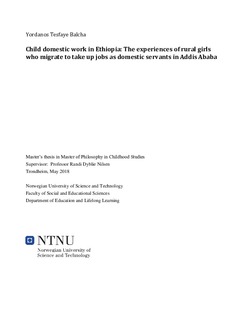Child domestic work in Ethiopia - The experiences of rural girls who migrate to take up jobs as domestic servants in Addis Ababa
Master thesis
Permanent lenke
http://hdl.handle.net/11250/2573882Utgivelsesdato
2018Metadata
Vis full innførselSamlinger
Sammendrag
―Domestic work‖ means work performed in or for a household or households, it covers a wide range of tasks and services that vary from country to country (ILO, 2013). Domestic work differs depending on the age, gender, ethnic background and migration status of the workers, the cultural and economic context in which they work (ILO).
Regardless of different efforts by governmental bodies to prohibit children from work, children continued to work. Children lived experiences been represented from different adult and Eurocentric perspectives.
This paper studied the experiences of rural girls who migrate from rural to urban areas to be a domestic worker. To this end, the research question is as follows: what are the reasons behind child domestic workers migrating to an urban area? How is the work and relationship with brokers, kin, and employers? What are they getting out of the work?
This study focuses on children point of view, by applying child-centered methods and ethical principles that encourage children to participate to the highest. They are migrating to fulfill personal desires, economic empowerment, and family expectations. They have a very dynamic relationship and they have very impressive negotiating abilities to minimize the power imbalance between them and the adult kin, brokers and employers. The lived experiences of the child domestic workers showed that they developed resilience, sense of self-worth out of the work experience.
Further Ethnographic studies could be undertaken to find out the untold capacities and needs of child domestic workers. On this basis, it is recommended that participation of domestic workers in empowering trainings and decision-making processes could help to enhance their capacity and safety in the work.
